Atlassian Bundle
Who Really Owns Atlassian?
Ever wondered who steers the ship at one of the tech world's most innovative companies? Unveiling the Atlassian SWOT Analysis reveals more than just product strengths; it also highlights the crucial role of its ownership structure. Understanding the ownership of Atlassian is key to grasping its strategic direction and future potential. This examination dives deep into the company's ownership journey.
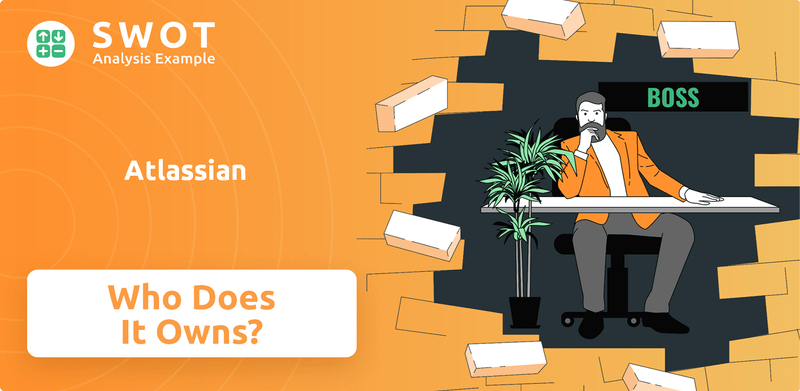
From its humble beginnings in Sydney to its current status as a global software giant, the Atlassian company story is one of remarkable growth. Knowing who owns Atlassian provides critical insights into its governance and market strategy. This exploration will uncover the influence of the Atlassian founders, key investors, and the impact of being a publicly traded entity. Discover the forces shaping the future of this dynamic tech leader and how to invest in Atlassian stock.
Who Founded Atlassian?
The story of the Atlassian company begins with its founders, Mike Cannon-Brookes and Scott Farquhar. Their journey started in 2002, driven by a shared desire to forge their own path. This led them to build a company that would eventually become a significant player in the software industry.
Initially, the company was funded with a modest $10,000 credit card debt. This bootstrapping approach highlights the founders' early commitment and resourcefulness. The company's evolution from supporting other customer service teams to developing its own products, such as Jira and Confluence, showcases its adaptive strategy.
The founders maintained substantial control in the early years of Atlassian. This control allowed them to shape the company's culture and values. Their commitment to social good, demonstrated by establishing the Atlassian Foundation, reflects their vision for a broader impact.
Mike Cannon-Brookes and Scott Farquhar founded Atlassian in 2002. They met at the University of New South Wales in Sydney, Australia.
The company started with a $10,000 credit card debt. This early funding was crucial for the company's initial operations and product development.
Atlassian initially focused on bug-tracking software, Jira. Confluence, a team collaboration platform, was launched in 2004.
The founders retained significant control in the early years. This allowed them to shape the company's direction and culture.
In 2006, the founders pledged to donate 1% of equity, profit, time, and product to social good. The Atlassian Foundation was established in 2008.
In July 2010, Atlassian secured $60 million in venture capital from Accel Partners. This marked a significant step in the company's growth.
The early commitment to social good and the founders' vision set the stage for Atlassian's future. The company's journey, from its humble beginnings to its current status, showcases a commitment to innovation and impact. To understand more about the company's financial model, you can review Revenue Streams & Business Model of Atlassian. As of 2024, Atlassian's market capitalization is approximately $58 billion, reflecting its growth and success since its founding. The company's headquarters are located in Sydney, Australia, with a significant presence in the global market.
The founders' early decisions shaped Atlassian's culture and direction.
- Atlassian was founded by Mike Cannon-Brookes and Scott Farquhar in 2002.
- The initial funding came from a $10,000 credit card debt.
- Jira and Confluence are key products developed early on.
- The founders maintained significant control in the early years.
Atlassian SWOT Analysis
- Complete SWOT Breakdown
- Fully Customizable
- Editable in Excel & Word
- Professional Formatting
- Investor-Ready Format
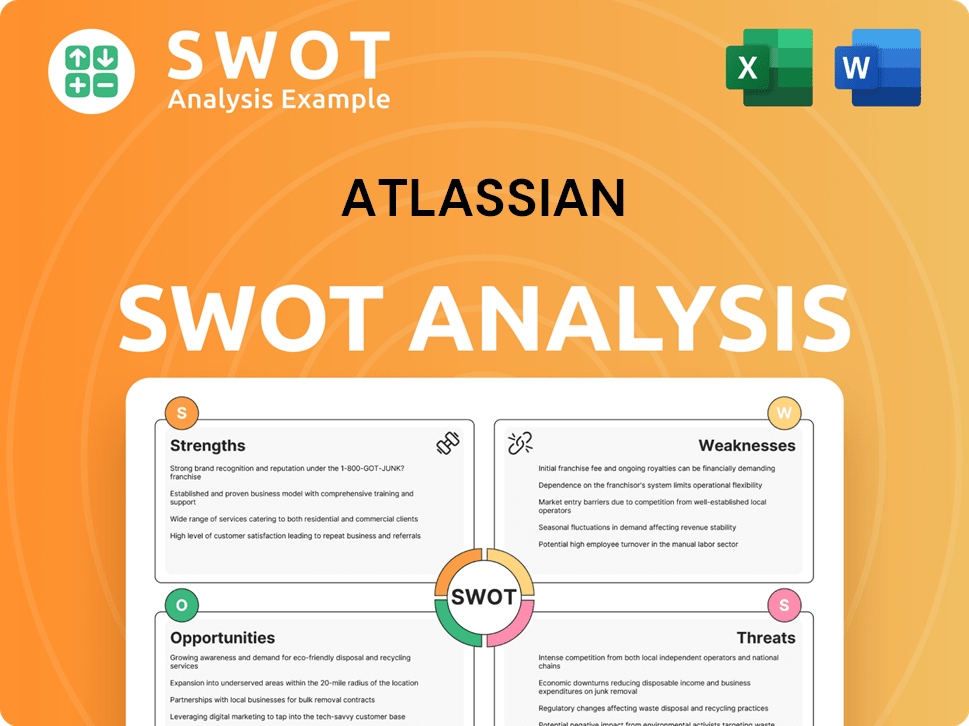
How Has Atlassian’s Ownership Changed Over Time?
The Growth Strategy of Atlassian has been significantly shaped by its ownership evolution. The company's journey took a major turn with its Initial Public Offering (IPO) on December 10, 2015, when it began trading on the NASDAQ under the ticker symbol TEAM. This IPO marked a market capitalization of $4.37 billion, signaling a new phase of growth and investor interest for the company.
The structure of who owns Atlassian has remained relatively stable since its IPO, with institutional investors playing a crucial role. The founders, Mike Cannon-Brookes and Scott Farquhar, have maintained significant control through a dual-class share structure. This structure has allowed them to guide the company's long-term strategy while also benefiting from the resources of the public market.
| Key Dates | Event | Impact on Ownership |
|---|---|---|
| December 10, 2015 | Atlassian IPO | Transitioned from private to public ownership; established market capitalization. |
| June 30, 2022 | Founder Shareholding | Cannon-Brookes and Farquhar collectively owned 99.45% of Class B shares, controlling 87.92% of total voting power. |
| March 2025 | Institutional Ownership | Institutional investors hold a robust 94% of Atlassian's shares. |
| June 6, 2025 | Founder Voting Control | Cannon-Brookes and Farquhar retain 38% voting control. |
As of March 2025, institutional investors hold a substantial 94% of shares in Atlassian, demonstrating strong external confidence in the company. Key institutional shareholders include Vanguard Group Inc, BlackRock, Inc., Baillie Gifford & Co, and T. Rowe Price Associates, Inc. Despite this, Atlassian founders, Mike Cannon-Brookes and Scott Farquhar, maintain considerable control. For the fiscal year 2024, Atlassian reported a total revenue of $4.4 billion. In the third quarter of fiscal year 2025, ended March 31, 2025, total revenue was $1,356.7 million, a 14% increase from the same period in fiscal year 2024, with cloud revenue growing by 25% year-over-year in Q3 FY25.
Atlassian's ownership is primarily composed of institutional investors and the company's founders, Mike Cannon-Brookes and Scott Farquhar.
- Institutional investors hold a significant portion of the shares.
- The founders retain substantial control through a dual-class share structure.
- The company's financial performance continues to show growth.
- Atlassian's market capitalization was $4.37 billion at the time of its IPO.
Atlassian PESTLE Analysis
- Covers All 6 PESTLE Categories
- No Research Needed – Save Hours of Work
- Built by Experts, Trusted by Consultants
- Instant Download, Ready to Use
- 100% Editable, Fully Customizable
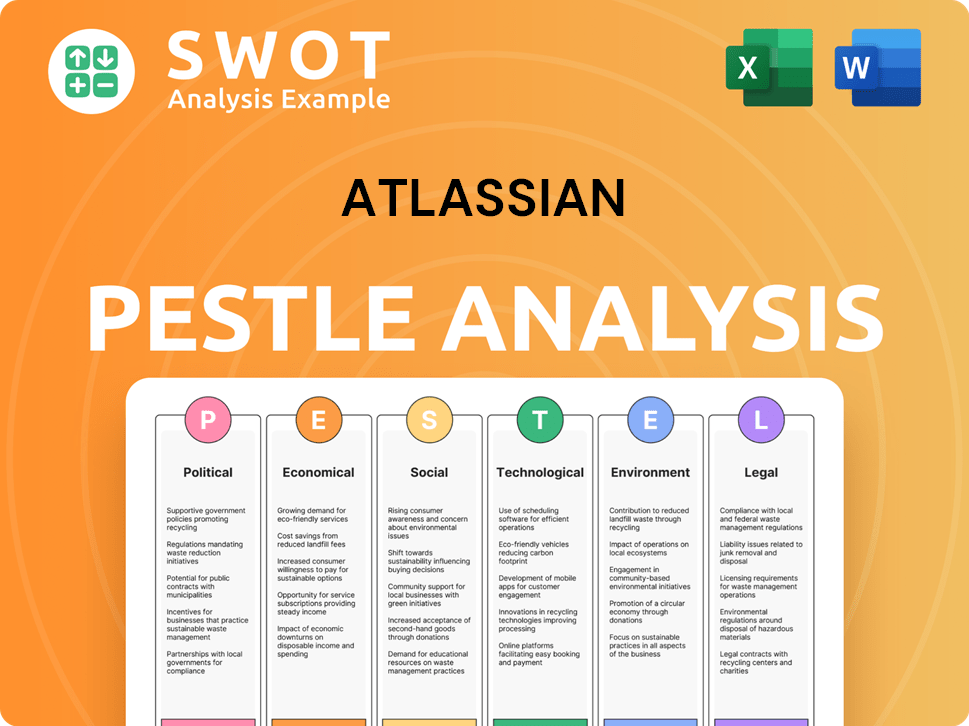
Who Sits on Atlassian’s Board?
The current board of directors significantly influences the governance of the Atlassian company. The company operates under a dual-class share structure, impacting the voting power dynamics. While specific shareholding percentages for each board member aren't publicly detailed for 2025, the co-founders, Mike Cannon-Brookes and Scott Farquhar, maintain substantial control.
As of June 6, 2025, the co-founders collectively hold 38% of the voting control, largely through their ownership of Class B shares. This structure, which gave them 87% of the voting power as of May 2024, allows them to retain significant influence over strategic decisions, even with a broader base of public shareholders. For further insights, you can explore the Brief History of Atlassian.
| Board Member | Role | Notes |
|---|---|---|
| Mike Cannon-Brookes | Co-founder | Significant voting power. |
| Scott Farquhar | Co-founder | Significant voting power. |
| Karen Dykstra | Board Member | Recently appointed. |
| Christian Smith | Board Member | Joined January 1, 2025; serves on the Nominating and Corporate Governance Committee. |
Recent board updates include Karen Dykstra's appointment and Christian Smith joining the board in early 2025. Jay Parikh retired as a director by the end of 2024. Smith, with over 25 years of experience, is part of the Nominating and Corporate Governance Committee. Information on board composition and ownership can be found in Atlassian's investor relations website and SEC filings, including Forms 10-K and 10-Q. The company's history and strong organic growth opportunities are viewed as mitigating potential risks associated with controlling ownership.
Atlassian's founders retain significant voting power through a dual-class share structure, impacting company control. The board includes recent appointments and changes, reflecting ongoing governance adjustments.
- Co-founders hold substantial voting control.
- Board composition changes reflect governance updates.
- Dual-class structure influences strategic decisions.
- Public filings provide detailed ownership information.
Atlassian Business Model Canvas
- Complete 9-Block Business Model Canvas
- Effortlessly Communicate Your Business Strategy
- Investor-Ready BMC Format
- 100% Editable and Customizable
- Clear and Structured Layout
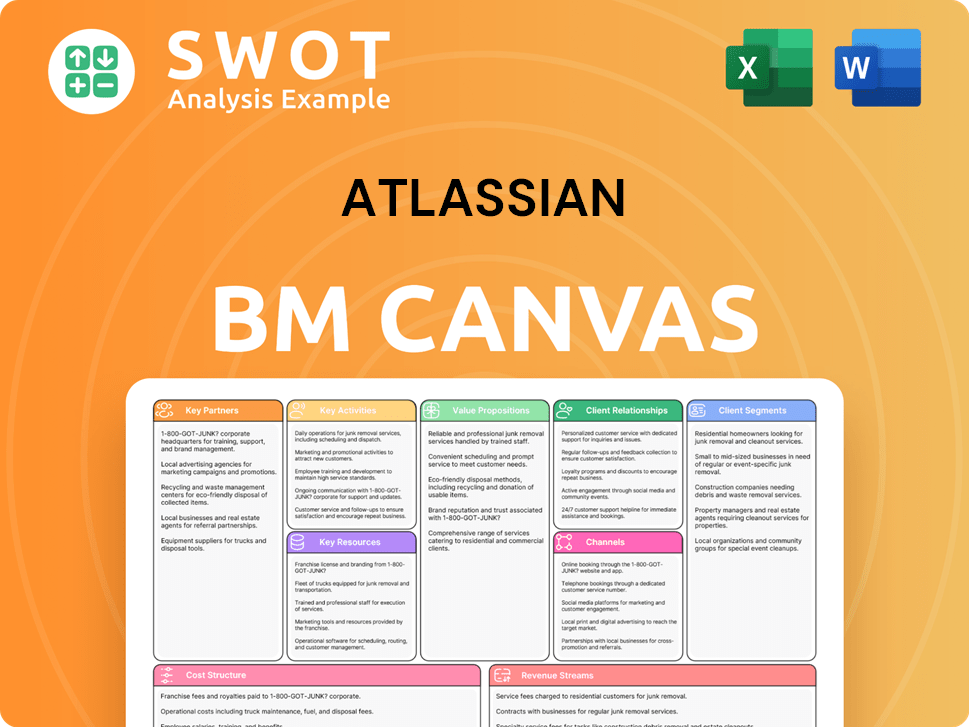
What Recent Changes Have Shaped Atlassian’s Ownership Landscape?
Over the past few years, the ownership structure of the Atlassian company has seen significant shifts, reflecting strategic decisions and market dynamics. The company has actively engaged in share repurchases, signaling confidence in its future. For instance, in the first quarter of 2025, Atlassian repurchased 609,000 shares for $138.88 million, representing a 279.64% increase in share buybacks compared to the same period last year.
Simultaneously, there has been notable insider selling activity. In May 2025, co-founders Michael Cannon-Brookes and Scott Farquhar each sold 1.7 million shares. Despite these sales, the founders retain substantial voting control, holding 38% as of June 6, 2025. This indicates a continued long-term commitment from the founders. Institutional ownership remains strong at 94%, suggesting that external investors remain confident in the company's prospects.
| Metric | Details | Data |
|---|---|---|
| Share Repurchase Program (Authorized) | New Share Repurchase Program | $1.5 billion (September 2024) |
| Share Repurchase Program (Completed) | Previous Share Repurchase Program | $1.0 billion (January 2023) |
| Shares Repurchased (Q1 2025) | Number of Shares | 609,000 |
| Share Repurchase Cost (Q1 2025) | Total Cost | $138.88 million |
| Share Buyback Increase (Q1 2025 YoY) | Percentage Increase | 279.64% |
| Insider Sales (May 19, 2025) | Co-founder Sales | 1.7 million shares each |
| Total Value of Insider Sales | Combined Value | Over $360 million |
| Founders' Voting Control (June 6, 2025) | Percentage of Control | 38% |
| Institutional Ownership | Percentage of Ownership | 94% |
Atlassian's strategic focus includes expanding its product offerings through acquisitions and partnerships. The acquisition of Loom in October 2023 for approximately $975 million and Rewatch in August 2024 highlights the company's efforts to integrate new technologies and enhance its portfolio. These moves align with Atlassian's goal to advance AI capabilities and promote team collaboration. Furthermore, strategic partnerships, such as the one with Amazon Web Services (AWS), are being expanded to streamline cloud migrations for enterprises.
Atlassian's ownership structure is evolving, marked by share repurchases and insider selling. The founders maintain significant control, and institutional ownership remains high.
The company's share repurchase program and insider transactions reflect strategic capital allocation decisions. These actions are influenced by the market and leadership's view of the company's future.
Atlassian acquired Loom and Rewatch to expand its product offerings. These acquisitions reflect the company's commitment to innovation and market expansion.
The company is focusing on advanced AI capabilities and strategic partnerships to drive growth. This includes expanding collaborations like the one with AWS.
Atlassian Porter's Five Forces Analysis
- Covers All 5 Competitive Forces in Detail
- Structured for Consultants, Students, and Founders
- 100% Editable in Microsoft Word & Excel
- Instant Digital Download – Use Immediately
- Compatible with Mac & PC – Fully Unlocked
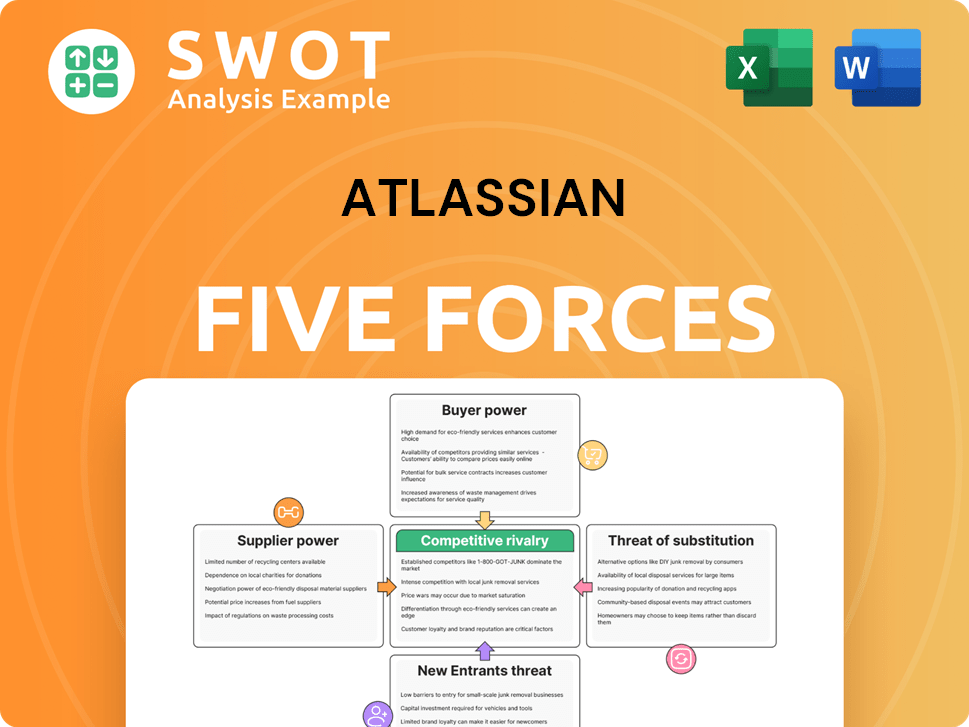
Related Blogs
- What are Mission Vision & Core Values of Atlassian Company?
- What is Competitive Landscape of Atlassian Company?
- What is Growth Strategy and Future Prospects of Atlassian Company?
- How Does Atlassian Company Work?
- What is Sales and Marketing Strategy of Atlassian Company?
- What is Brief History of Atlassian Company?
- What is Customer Demographics and Target Market of Atlassian Company?
Disclaimer
All information, articles, and product details provided on this website are for general informational and educational purposes only. We do not claim any ownership over, nor do we intend to infringe upon, any trademarks, copyrights, logos, brand names, or other intellectual property mentioned or depicted on this site. Such intellectual property remains the property of its respective owners, and any references here are made solely for identification or informational purposes, without implying any affiliation, endorsement, or partnership.
We make no representations or warranties, express or implied, regarding the accuracy, completeness, or suitability of any content or products presented. Nothing on this website should be construed as legal, tax, investment, financial, medical, or other professional advice. In addition, no part of this site—including articles or product references—constitutes a solicitation, recommendation, endorsement, advertisement, or offer to buy or sell any securities, franchises, or other financial instruments, particularly in jurisdictions where such activity would be unlawful.
All content is of a general nature and may not address the specific circumstances of any individual or entity. It is not a substitute for professional advice or services. Any actions you take based on the information provided here are strictly at your own risk. You accept full responsibility for any decisions or outcomes arising from your use of this website and agree to release us from any liability in connection with your use of, or reliance upon, the content or products found herein.